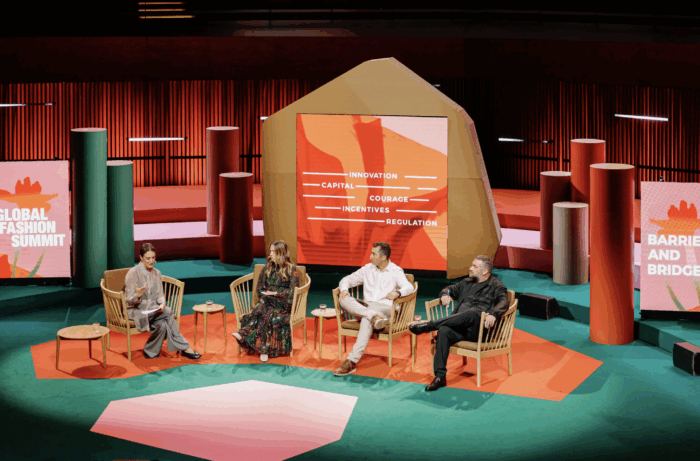
From the Karoo to Copenhagen, Brett Walker Elevates South African Mohair & Wool on the World’s Luxury Fashion Stage
[Copenhagen, Denmark – 9 June 2025]
South Africa’s leadership in regenerative agriculture took centre stage at this year’s Global Fashion Summit in Copenhagen, as Brett Walker, a seventh-generation mohair and wool farmer from the Eastern Cape, South Africa joined global voices calling for systemic change in the fashion and textile industries. Representing both his family’s farm and a broader community of land-based producers, Walker brought authenticity and grounded expertise to a panel titled “Sustaining Textile Systems: Regeneration in Practice.”
Moderated by Lucianne Tonti (The Guardian), Walker joined Federico Brugnoli, CEO of SPIN360, and Beth Jensen, Climate Director of Textile Exchange on the panel which explored the critical role of regenerative agriculture in restoring ecosystems, building supply chain resilience, and reshaping the way fashion sources its materials.
“We farm with nature, not against it,” Walker told the audience. “In the 1980s, my mother realised we had an ecological problem. We didn’t wait for the market — we changed how we worked by following the Alan Savory principles. By rotating sheep, goats, and cattle — each grazing differently — we continue to restore biodiversity and build soil health. Regeneration has become a ‘buzzword’ in fashion but for us it isn’t a trend, it’s how we live.”
The panel conversation underscored a collective call for action: regeneration is not a marketing label, but a transformation of systems — one that begins with the land and requires meaningful, long-term alignment across brands, investors, and policymakers. As Brugnoli noted, “without a common language and shared measurement, progress remains fragmented. Regeneration must be supported with intent, investment, and integrity.”
“At SPIN360, we see regeneration not as a checklist, but as a context-driven system rooted in long-term environmental and economic outcomes,” said Brugnoli. “For materials to be truly regenerative, we need shared metrics, collaborative frameworks, and sustained support for the farmers who steward the land.”
Walker’s story exemplifies a broader momentum in South Africa, anchored by a landmark partnership between Mohair South Africa (MSA) and SPIN360, the global sustainability consultancy known for working across the fashion and automotive supply chains, driving innovation and co-creating sustainability activities based on science and data across natural material supply chains.
With the global fashion industry demanding greater traceability, environmental transparency, and credible sustainability claims, MSA has partnered SPIN360 to lead a multi-faceted project to support mohair’s relevance in the fast-changing and regulated fashion industry.
The project includes the development of LCA data from farms to fabrics, the creation of internationally recognised Product Category Rules (PCRs), and a science-based sustainability roadmap that unites farmers, brokers, processors, spinners, weavers and brands under a unified, measurable vision for climate and nature leadership.
To strengthen its commitment to this mission, SPIN360 has established a dedicated office in South Africa, recognising the country’s vital role in producing exceptional natural materials — including wool, mohair, leather, cotton, and dissolving pulp. The office is led by Lindsay Humphreys, SPIN360’s Head of Global Strategy and Partnerships, who brings over 15 years of experience working across the natural material value chain, from on-the-ground collaboration with farmers to strategic partnerships with global fashion brands. “South Africa offers more than just premium materials — it brings generations of regenerative knowledge, often practiced without certification or recognition,” said Humphreys. “We’re here to help make that knowledge visible, measurable, and globally valued.”
As the global fashion industry is navigating an evolving legislative landscape with material choices being key to decarbonizing their supply chains, South African farmers are not just participating — they are leading. From the Karoo to Copenhagen, the message resonated: regeneration is not a campaign — it is a commitment to future generations, rooted in the soil beneath our feet.
Join Our Sustainable Solutions
Reach out to us to explore tailored solutions for making your company more sustainable. Start a project with SPIN360 and drive meaningful change.
Get in Touch